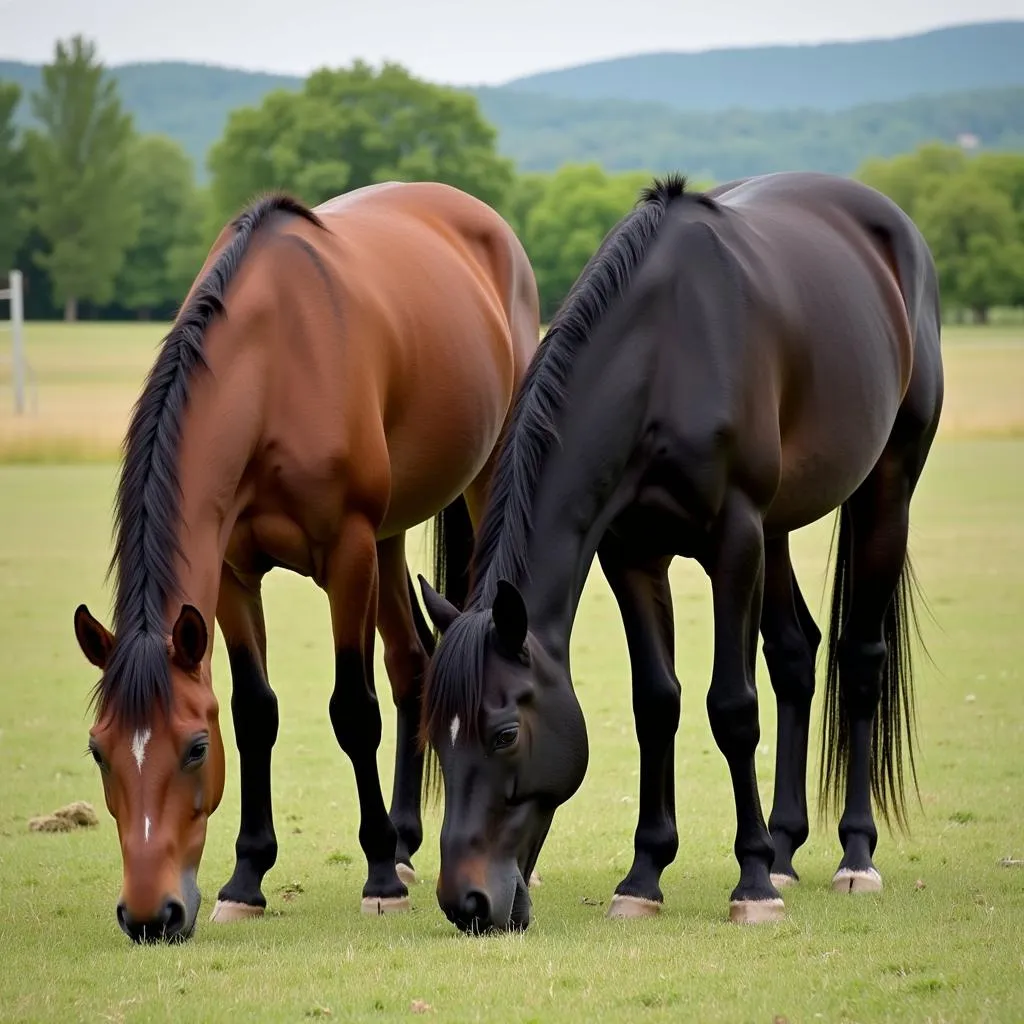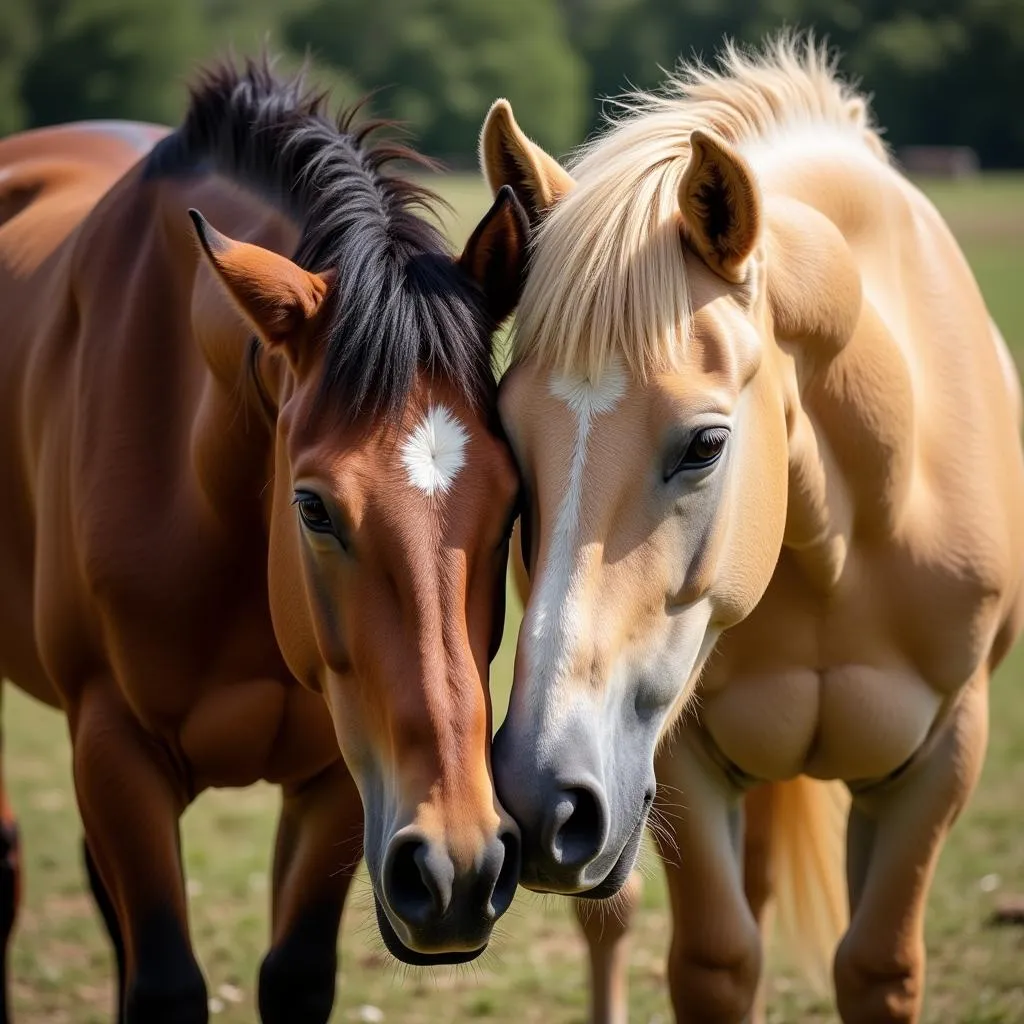A Companion Horse can be a valuable addition to your stable, offering companionship to your current horse and providing numerous other benefits. But finding the right companion horse is crucial to ensure harmony and well-being for all. This guide delves into everything you need to know about choosing the perfect companion horse for your equine friend.
Understanding the Importance of a Companion Horse
Horses are naturally social animals that thrive in herds. In a domestic setting, a companion horse can help fulfill this innate need for interaction.  Two horses grazing peacefully together in a lush pasture A companion horse can alleviate boredom, reduce stress, and even improve your horse’s overall health.
Two horses grazing peacefully together in a lush pasture A companion horse can alleviate boredom, reduce stress, and even improve your horse’s overall health.
Factors to Consider When Choosing a Companion Horse
Age and Temperament:
- Age: Aim for a horse of a similar age to your current horse, or slightly older. Young, energetic horses may be too much for a senior horse to handle. Conversely, a senior horse may not be able to keep up with a youngster.
- Temperament: Matching temperaments is crucial. A calm, easygoing horse is usually a safe bet. Observe potential companions interacting with other horses to gauge their personality.
Breed and Size:
While not as critical as temperament, considering breed and size can be helpful.
- Breed: Certain breeds are known for their gentle and sociable nature, such as Quarter Horses, Paints, and some draft breeds.
- Size: Choosing a companion horse of a similar size to your current horse can help prevent injuries during play and minimize feed-related issues.
Health and Soundness:
- Health History: Request a full health history from the seller, including vaccination records and any previous illnesses or injuries.
- Pre-Purchase Exam: Always have a veterinarian conduct a pre-purchase exam to assess the horse’s overall health and soundness.
Introducing Your New Companion Horse
A gradual introduction is essential for a smooth transition:
- Separate Pastures: Start by keeping the horses in separate but adjacent pastures. This allows them to see, smell, and hear each other without direct contact.
- Supervised Visits: Once they show signs of familiarity, allow short, supervised visits in a controlled area like an arena.
- Gradual Integration: Gradually increase the duration of their interactions, monitoring their body language closely.
- Full-Time Companionship: When you observe consistently positive interactions, they are likely ready for full-time companionship.
Maintaining a Harmonious Relationship
- Separate Feeding: Always feed horses separately to prevent competition and potential aggression, especially if one horse is more dominant.
- Ample Space: Ensure adequate pasture space to allow the horses to establish their own personal boundaries.
- Continued Observation: Even after integration, continue to observe their interactions for any signs of tension or aggression.
FAQs About Companion Horses
1. Can a donkey be a good companion for a horse?
Yes, donkeys can make excellent companions for horses. They offer many of the same benefits as another horse and can even provide protection from predators.
2. What if my horse doesn’t get along with its new companion?
Not all horses will become best friends, and some pairings simply won’t work out. If you notice persistent aggression or tension, it’s best to separate the horses and explore other options.
Finding Your Perfect Pair
 Two horses stand head-to-head in a friendly nuzzle, showcasing their bond. Choosing the right companion horse is a significant decision. By carefully considering the factors outlined above and patiently introducing your new horse, you can increase the likelihood of a successful and enriching partnership for both your equine companions. For more information on horse care, explore our articles on horse stall fronts and toothpaste for horses.
Two horses stand head-to-head in a friendly nuzzle, showcasing their bond. Choosing the right companion horse is a significant decision. By carefully considering the factors outlined above and patiently introducing your new horse, you can increase the likelihood of a successful and enriching partnership for both your equine companions. For more information on horse care, explore our articles on horse stall fronts and toothpaste for horses.
If you’re ready to find your perfect companion horse, contact us at Phone Number: 0772127271, Email: [email protected] or visit us at QGM2+WX2, Vị Trung, Vị Thuỷ, Hậu Giang, Việt Nam. Our team is available 24/7 to assist you.